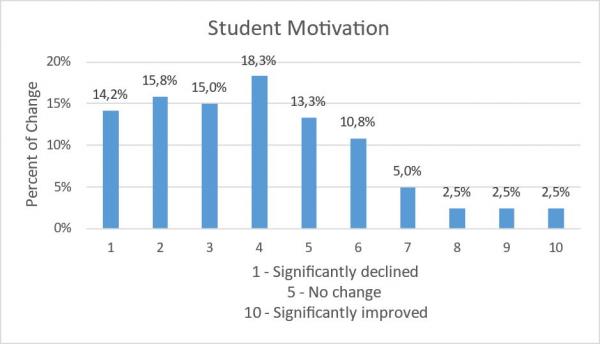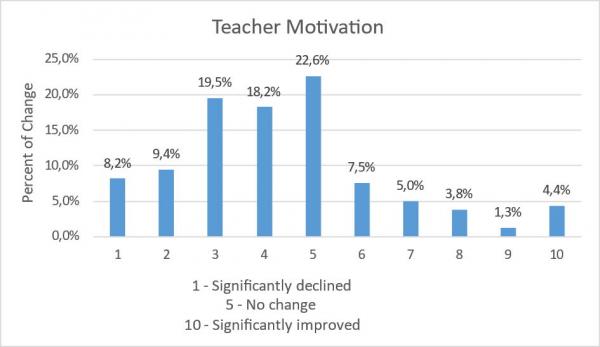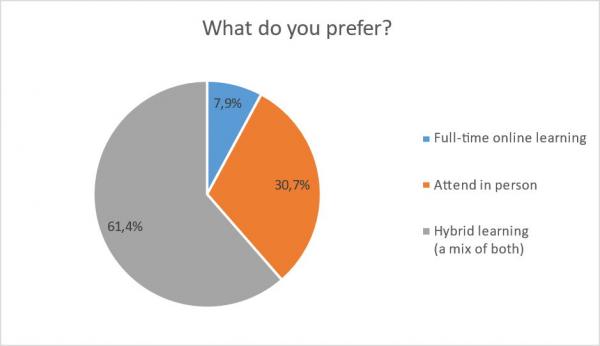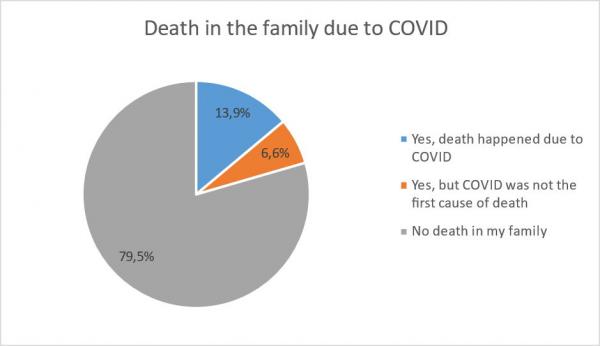
|
Date: March 18.15:40:12 2022 Source : doksi.net/en |
Online learning may have much negative effects beside the generally known positive ones – this turned out from a survey conducted by Doksi.net. It revealed that learning from home goes hand in hand with outstanding exam grades, enormous learning loss, extremely low motivational level and the overall picture is even more depressing.
Doksi.net compiled a COVID-study among the participants of public education to assess the kinds of outcomes and effects of online learning having on learners’ and teachers’ life.
The level of students’ motivation decreased substantially in spite of the constantly improving exam results. 63,3% of participants think that their commitment is hard-hit by the new teaching method, only 23,3% of them think online learning is an incentive.

Student motivation
A bit more than the half of respondents’ (55,2%) opinion was that Teachers’ motivation hit the bottom, 21,5% of them think that their energy level is more likely to increase, 23,3% think that there was no change in their commitment.

Teacher motivation
The quality of online learning is not affected by digitalization
There is no doubt that digitalization emerged as a must for public education and the private sector, boosting interrelation of them. The efficiency of teaching and educational platforms is significantly improved even so the expression of learning loss is getting more popular nowadays in public education. Some international surveys emphasize that the quality of online learning is much more dependent on the participants’ commitment than the availability of digital resources or infrastructure.
The Proceedings of the National Academy of Sciences, PNAS announced that learning loss of Dutch high-school learners is between 20-50% for a year, however their preparedness for online learning is highly above the average in EU.
A mother said:
"Online learning means so much fun for undergraduate and high school students. There was no need to be at school, they could fiddle about all the time, chilling around on social media, and they did their homework in groups or just had it done by their oldies. The parents confronted with their children’s intellectual ability, lack of drive and enthusiasm – no matter how institutions boosted their grades. There was no need to pass a language exam to graduate, all they needed to pass online final exams. Educational institutions produced only useless grads these times. "
What do students prefer?
You easily admit that sustainability can be a threatening issue in the long run assuming that there will not be any significant progress in online learning. Doksi.net asked the participants about what they prefer, let’s see the answers below.

What do you prefer?
Coronavirus in the eye of online learners, real problem or media hype?
Hungarian Central Statistical Office (KSH in Hungarian) revealed the fact that approx. 9000 people died in 2020 interrelated with COVID-19, and around 31000 people gone due to cancer. It means three times more at risk because of tumorous diseases than COVID-19.
You also have to consider the method of COVID-deaths’ statistical measurement. Hungarian authorities consider a death covid-related if someone has a positive COVID test before dying. In most of the cases death is due to other chronic diseases and COVID is not the first common cause of death. You can easily recognize that only a portion of 9000 deaths’ cause was the Coronavirus! Other interesting thing to assess is that statistics of COVID-deaths include all the deaths related to COVID-19, while other statistics – for example statistics about cardiac diseases(26280)-,car accidents(554)-, stroke(11488) related deaths – include only the first cause of death.
While death and deterioration of state of health due to cancelled hospital treatment is not measured, self-wrong increased by 10% compared to 2019, but still behind the figures of 2010. (2010: 2492 person, 2020: 1706 person)
74,6% of the participants hasn’t been infected, or just not identified. You can see the answers’ given to the question “Was there any death due to COVID in your family” below.

Death in the family due to COVID
63,5% of participants consider COVID19 as a moderate threat while the rest thinks it is a serious danger to humanity. Even though 86,1% of participants had no death in family where COVID was the first cause of death.
Distress, loneliness, aggression and conflict-resolution problems
Generation Z or zoomers (born between 2000 and 2010) and Generation Alpha (born after 2010) are prone to have intense emotions. In all generations, these students are shaped and connected by the same life events, trends and processes such as surfing on the web and online learning. On the other hand, they are more like create – and not just consume – online content.
Cyberspace and social media provide a stimulating environment. Virtual spaces are characterized by multitasking, impulsiveness, relies more on visuality and represents a new digital personality, but also brings serious changes in the development of a personality at the same time. While the digital personality is characterized by curiosity, individual goes with fatigue, impatience and irritability in the case of the Z and Alpha generations. The members of today’s Z generation are mostly described by alienation from the environment, difficulty to fit into society, solitude, insatiability, rat race for success and money, lack of conflict resolution skills, aggression, anxiety, which can be further enhanced by the 7-8 hours spent online daily.
The question of how hybrid learning can be sustainable in the long run can be really overwhelming. The question is: how education policy supposed to manage the negative personal characteristics? It is easy to be exhausted if a student is unable to attend classes in person. In addition to all of these changes this new situation may have a serious impact on employment as well.
If you are interested in the impact to students’ life made by COVID, you can access the whole study here for free: COVID-Impact to students’ life.
Do you have a good idea? Write a guest post for us!
Recommended articles
Political Awareness in IT Management
As a first-time manager one of your responsibilities is to find ways to improve daily teamwork. People may cut you slack in the beginning, but remember: time won’t stop until you are ready. Teams rarely work alone, so your squad works in a project setting, with daily connection to several groups from various departments with different interests.
Recommended documents- COVID-19 Vaccinations and Allergies FAQ / 2021, 7 page(s)
- COVID-19 Vaccination Fact Sheet / 2021, 8 page(s)
- COVID-19 Vaccine, FAQ / 2021, 4 page(s)
- COVID-19 Immunization Plan / 2021, 8 page(s)
- Pfizer COVID-19 Vaccine After Care Sheet / 2021, 4 page(s)
